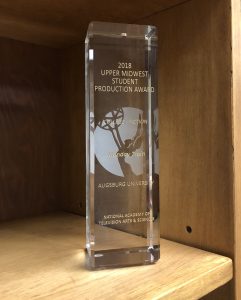
Written by: Sarah Van Sickle
Congratulations to all of the Augsburg students that were nominated for a Student Production Award from the Upper Midwest Emmy® Foundation! Nominations were announced today and Augsburg has six nominations in five categories. The Upper Midwest Chapter of the Academy of Television Arts and Sciences recognizes outstanding achievement in student filmmaking. While Augsburg has been nominated before and won twice, this is the most nominations the University has ever received. The 2019 Student Awards Ceremony takes place on April 12th.
Augsburg nominations are as follows:
Short Form: Fiction
“Cycle,” directed by Winston Heckt; editing/sound by Lukas Olson; written by Lauren Tabor; and advised by Robert Cowgill.
“Fairy of the Night,” directed by Joel Myers and advised by Jila Nikpay.
Long Form: Fiction
“Take Me Home,” written/directed by Rebecca Lynn Schroeder; editing/sound by Lukas Olson; camera/editing by Winston Heckt; produced by Francesca Chiari; assistant director Meredith Carstens; production design by Olivia Drury; and advised by Jenny Hanson.
Commercial
“Lets Talk,” directed/produced by Adrianna Foreman and advised by Jenny Hanson.
Animation/Graphics/Special Effects
“Rodney and Jimmy and the Campfire,” directed by Joel Myers and advised by Jenny Hanson.
Editor
“Amusement,” edited by Joel Myers.

